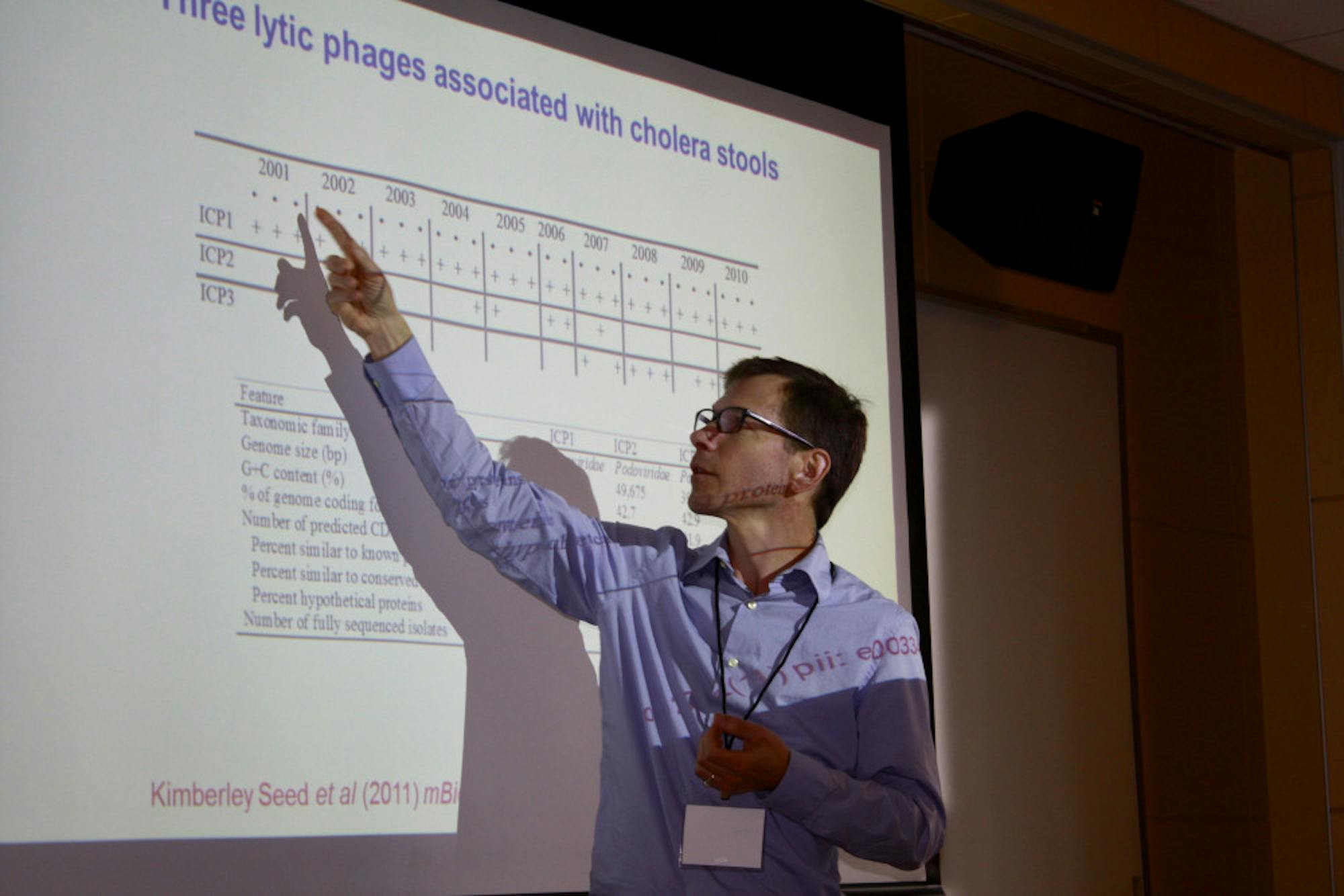From carrying out medical and health research in the lab to investigating issues of bioethics, Tufts Synthetic Biology team members seek to expand its undergraduate science education beyond the classroom.
Tufts Synthetic Biology was founded in the spring of 2013, by Christopher Ghadban (E '14) and Petar Todorov (LA '14). The idea first came about when Todorov visited the Whitehead Institute for Biomedical Research with Sherman Teichman, the founding director of the Tufts Institute for Global Leadership. In his visit, he discovered a global competition called the International Genetically Engineered Machine (iGEM) and realized that Tufts did not have a team for it.
Upon returning from his visit, Todorov and Ghadban founded the first Tufts iGEM team. In the past two years, the group has evolved immensely.
"[It started with] meetings with like-minded students on a weekly basis and a consistent contact with the Office of the Vice Provost for Research to work with corporations to fund the program, find professors to advise the group and set up an account with Tufts so that donations would be tax-exempt,” Ghadban said. "[We hoped] to compete in the iGEM competition, an undergraduate synthetic biology competition. The purpose of the iGEM competition is to confer a function to a microorganism that does not naturally occur, or increase a function that does naturally occur."
Whereas many iGEM teams have funding from their professors, or get ideas from existing research, Tufts Synthetic Biology is unique because it is completely student-run, Todorov explained.
“Tufts Synthetic Biology offers unparalleled independence in undergraduate research from the design phase to actual lab work,” member Connor McBrine, a junior, told the Daily in an email.
According to member Peter Cavanagh, a junior, the group has already completed a project that focused on controlling biofilm formation and bacteria movement through genetic engineering methods.
"This has applications in cleaning up oil spills and wastewater, and furthers our understanding of biofilm formation, which is the leading cause of Healthcare-Associated Infections (HAI’s), of which there are two million instances and 100,000 resulting deaths each year in the United States alone," he said in an email to the Daily.
Last fall, the club hosted a class in the fall through the Experimental College called "A Foray into Synthetic Biology" in which interested students were exposed to the fundamental principles behind synthetic biology. By the end of the semester, students came up with their own proposals. The best ones that could be completed by the iGEM deadline were then developed by club members over the spring and conducted over the summer.
According to Todorov, the group has acquired their funding from various corporations and have secured lab space year round.
"Working with the Synthetic Biology team is incredibly rewarding because we get to direct our own research on whatever topic interests us," Cavanagh said. "I've learned how to handle all aspects of the research process, from initial research proposals to developing the designs, to securing funding and support, to running a lab and executing lab research and organizing a team of researchers."
Given the group members' passion about their work with the team, the time commitment is challenging but rewarding.
"It's been a lot of work. Over the summer myself and a few other members were working nine to five jobs and then putting in full time work for iGEM at night and on weekends, but it's also been really worth it,” Cavanagh said.
The group has come a long way since its founding. Earlier this month on Oct. 3, Tufts Synthetic Biology hosted a public conference, “The Future of Phage and Synthetic Biology." On the morning of the conference, members of Tufts Synthetic Biology had the opportunity to sit down with expert panelists in the field.
The conference sought to “bring together experts from academia, industry and regulation to discuss and present on emerging research on the applications of phage - specifically bacteriophage therapy,” according to the Tufts iGEM website. The afternoon featured an open panel on these topics with a number of interested undergraduate students in attendance.
"Running the lecture series has created opportunities to meet and learn from some of this university’s most esteemed life science researchers," McBrine.
According to Cavanagh, the event was part of a project in which the group looked at bioethics and human practices.
"[It] brought together experts in the field to discuss the prospect of increasing the use of bacteriophage therapy to treat antibiotic-resistant infections," he said.
The event was just one example of the various ways that Tufts Synthetic Biology provides opportunities for its members.
“[The club has] given me a taste on all the amazing things that I can do with biology,” sophomore Michaela Gold said. “[It has] helped me in my classes, and working with a bunch of different professors has also given me professional connections.”
Tufts Synthetic Biology team puts passion to work

Tufts Synthetic Biology hosted a public conference, “The Future of Phage and Synthetic Biology," on Oct. 3 with experts who presented on research about the applications of phage.





